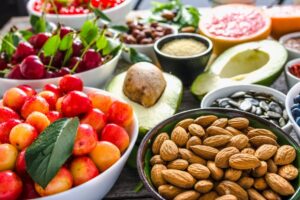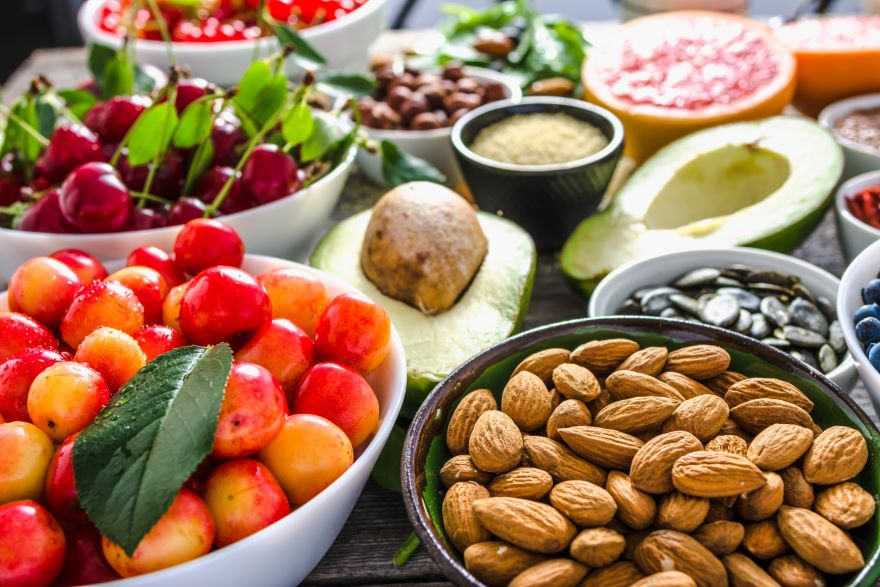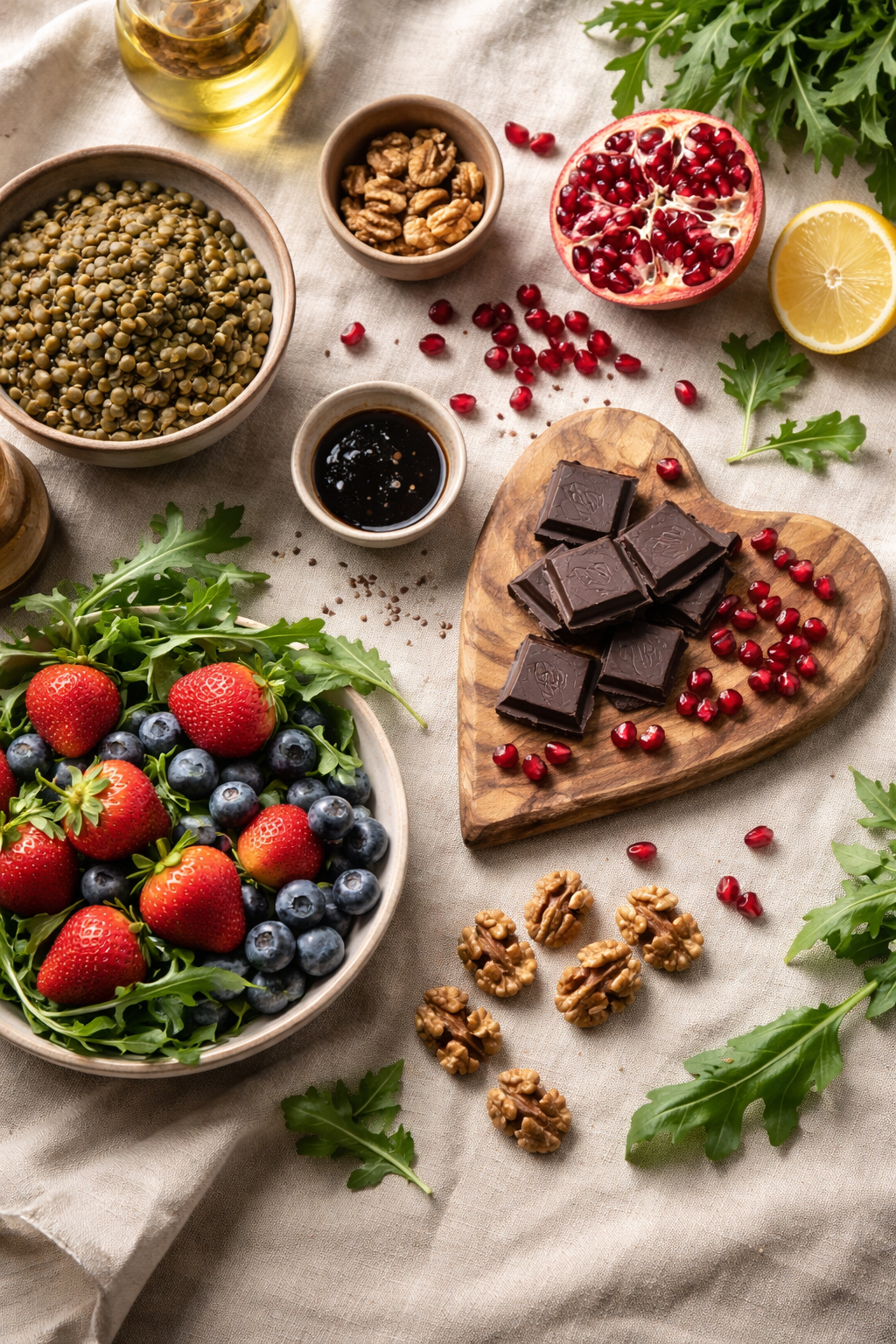Switching to a whole-food plant-based diet can significantly contribute to your overall health, and this extends to the snacks you choose to eat throughout the day. Whole-food plant-based snacks are those that are made from unrefined plants, including fruits, vegetables, grains, seeds, and nuts, and exclude or minimize processed foods. These snacks are not only beneficial because they are rich in essential vitamins, minerals, and nutrients, but they may also provide a variety of health benefits, ranging from weight management to improving heart health.

Understanding which snacks fit within a whole-food plant-based framework means recognizing the importance of whole, unprocessed ingredients. When snacking on a plant-based diet, consideration of the nutritional content is key—snacks should be satisfying, nutrient-dense, and provide energy. Additionally, with the right knowledge and preparation, transitioning to plant-based snacking can be a fulfilling part of any meal plan, suitable for all ages, requiring just a bit of creativity and know-how about which foods to include in your snack rotation.
Ensuring that these snacks are readily available can help prevent common pitfalls such as reaching for less nutritious, convenience foods. By stocking your pantry with the right ingredients and having a few go-to recipes, you can easily incorporate plant-based snacks into your diet that are both delicious and fulfilling.
Key Takeaways
- Plant-based snacks provide essential nutrients and health benefits.
- Snack preparation on a plant-based diet emphasizes whole, unprocessed foods.
- A stocked pantry aids in maintaining healthy snacking habits.
Understanding Whole-Food Plant-Based Snacks
When I think of whole-food plant-based (WFPB) snacks, I focus on foods that are closest to their natural state. These snacks are derived from plants, including vegetables, fruits, nuts, seeds, whole grains, and legumes. They exclude or minimize processed foods and animal products, emphasizing foods high in nutrients, fiber, protein, and healthy fats.
Why Choose WFPB Snacks?
- Nutrient-Dense: They provide essential vitamins and minerals.
- High Fiber: Natural fiber aids in digestion and can help regulate blood sugar.
- Natural Protein: Ensuring adequate intake, crucial for repair and growth.
- Healthy Fats: Nuts and seeds supply omega-3 fatty acids, beneficial for heart health.
| Snack Type | Examples | Benefits |
|---|---|---|
| Fruits | Apples, Berries | Fiber-rich, natural sugars |
| Vegetables | Carrots, Kale chips | Antioxidants, Low-calorie |
| Nuts/Seeds | Almonds, Chia seeds | Protein, Healthy fats |
| Legumes | Hummus, Edamame | Filling, Contains iron and zinc |
| Grains | Quinoa Salad, Oats | Sustained energy, B-vitamins |
I also consider the environmental impact of my food choices. Integrating WFPB snacks into my diet supports sustainability and benefits the ecosystem. This synergy can be compared to children’s wild edible plants knowledge in Madagascar, which holds a deep understanding of leveraging what the earth provides while preserving biodiversity.
In summary, WFPB snacks are not just good for my health, but they’re also aligned with a greener lifestyle. Choosing these snacks means opting for a life that values nutritional richness and environmental consciousness.
The Nutritional Advantages of Plant-Based Snacks
Incorporating plant-based snacks into a diet can lead to multiple nutritional benefits. These snacks often have a rich profile of protein, fiber, healthy fats, vitamins, and minerals that contribute to overall health.
Impact on Health and Well-being
Plant-based snacks, owing to their high nutritional value, could significantly impact health and well-being. A diet rich in plant-based foods is associated with a reduced risk of developing chronic diseases like non-alcoholic fatty liver disease. Choosing snacks that are high in fiber and healthy fats can also support weight management and heart health. For example, swapping out chips for nuts and seeds can aid in weight loss while providing a satisfying crunch.
Consuming a variety of fruits, vegetables, nuts, and seeds ensures a diverse intake of vitamins and minerals, which are crucial for body function and disease prevention. It’s also important to note that plant-based snacks with minimal processing retain most of their nutritional benefits.
Balancing Macronutrients
When selecting snacks, balancing macronutrients — protein, carbohydrates, and fats — is essential for sustained energy and satiety. Plant-based options offer substantial amounts of protein and fiber, which help in feeling full longer and regulating blood sugar levels. Healthy fats, such as those found in avocados, provide essential fatty acids and promote nutrient absorption.
Striking the right balance between these macronutrients can optimize your health. Legumes, for instance, are an excellent snack as they provide protein and fiber, contributing to this balance. Understanding the role of nutrition in managing and preventing health issues can guide snack choices for better health outcomes.
Exploring a Variety of Plant-Based Snacks
In my journey through healthy eating, I’ve found that diversity in snacks not only keeps things interesting but also ensures a range of nutrients. Below, I’ll discuss some of my go-to choices that keep me energized throughout the day.
Nuts and Seeds
Nuts and seeds are a cornerstone in my snack selection. Almonds and walnuts, for instance, are packed with healthy fats and protein. I often make my own trail mix by combining a variety of nuts, such as cashews and pistachios, with seeds like pumpkin and sunflower. Just a handful can be quite filling.
Fruits and Vegetables
My snack routine wouldn’t be complete without an array of fruits and veggies. I love munching on carrot sticks with nut butter or enjoying a piece of fresh fruit. Apples can be paired with almond butter for a satisfying crunch. Dried fruit offers a portable option, but I’m careful to check for added sugars.
Homemade Snacks
I take pride in creating homemade snacks whenever possible. With whole grains at the foundation, I bake easy granola bars and energy balls. These treats are not just tasty but are also free from preservatives, offering a clean snack option.
Store-Bought Options
While homemade is ideal, sometimes I need the convenience of store-bought vegan snacks. I look for items with minimal ingredients, such as plant-based snack bars or whole-grain crackers. Reading labels is key to avoiding unwanted additives.
Key Components of Satisfying Plant-Based Snacks
My experience has shown me that the most satisfying snacks are both nutritious and enjoyable. I aim to create a balance between flavor and health benefits.
What to Look for in a Snack
When I select snacks, I prioritize whole grains and healthy fats for sustained energy. Whole grains like quinoa or brown rice provide complex carbohydrates and are an excellent source of fiber, which aids in digestion and keeps me feeling full longer. Healthy fats, which I obtain from sources like avocados and nuts, are essential for brain health and also contribute to satiety. It’s crucial to ensure the snack includes plant-based proteins such as lentils or chickpeas, which support muscle repair and growth. I make it a point to incorporate colorful vegetables like carrots and celery, which are not only crunchy and satisfying but are packed with vitamins and minerals.
- Fiber: Integral for a satisfying snack. Makes you feel full and aids in digestion.
- Protein: Look for legumes, tofu, or tempeh to fuel your body.
- Healthy fats: Necessary for absorption of fat-soluble vitamins. Think nuts and seeds.
- Whole grains: Opt for brown rice, quinoa, or whole grain bread for complex carbs.
Reading Labels for Plant-Based Snacks
In my journey, I’ve learned the importance of reading labels to identify truly healthful snacks. Manufacturers may market products as “plant-based,” but the labels reveal the true nutritional value. I inspect the ingredient list for whole food items and check that fiber content is high and sugar is minimal. Moreover, examining the protein content to ensure it’s derived from a whole food source, such as nuts and seeds, rather than processed isolates, is a habit I’ve developed. I’m cautious of lengthy ingredient lists and added preservatives – the fewer the ingredients and the more recognizable they are, the better.
- Ingredients: Look for whole food items at the top of the list.
- Protein: Check that it comes from sources like nuts, not isolates.
- Fiber: Ensure there’s a good amount to promote fullness.
- Additives: Minimize consumption of snacks with preservatives or artificial ingredients.
Preparing Your Plant-Based Snack Pantry
When I decide to stock my pantry with plant-based snacks, I focus on whole foods that deliver both nutrition and flavor. My goal is to maintain a variety of items which allow me to quickly put together healthy snacks. Here’s how I prepare my plant-based snack pantry:
- Nuts and Seeds: Almonds, walnuts, and chia seeds are staples. They’re packed with protein and healthy fats, making them the perfect go-to snack. I make sure to have a mix of these for quick handfuls or adding crunch to dishes.
- Whole Grains: Quinoa and oats are my grains of choice for their versatility and fiber content. I find them ideal for creating snacks like overnight oats or quinoa salad.
Dried Fruits: I stock up on raisins, apricots, and dates which pair well with nuts and seeds for an energy boost. It’s important to check for added sugars, so I always opt for unsweetened varieties.
| Pantry Item | Uses |
| ----------------- | --------------------------------------- |
| Almonds | Handful for a snack, topping for oats |
| Chia Seeds | Puddings, smoothie boosters |
| Quinoa | Salads, snack bars |
| Rolled Oats | Overnight oats, granola |
| Raisins | Mixes with nuts, oatmeal additions |
For something savory, I keep chickpeas on hand. They can be roasted for a crunchy snack or mashed for a spread.
Ensuring a mix of these essential plant-based foods in my pantry allows me to easily put together nourishing snacks that keep me fueled throughout the day. With these items, I am confident I have the foundation for countless tasty and healthy snack options.
Tips for Snacking on a Whole-Food Plant-Based Diet
Adopting a snacking strategy that aligns with a whole-food plant-based diet can help maintain energy levels and provide essential nutrients. I’ll guide you through mindful snacking, managing portions, and harmonizing flavors and textures.
Mindful Snacking
It’s easy to eat snacks passively, especially when busy. I find that by paying attention to hunger cues and choosing snacks like whole fruits, which are rich in fiber and nutrients, not only do I stay full longer, but I’m also providing my body with wholesome fuel. Mindfulness is the key to making every bite count for health and satisfaction.
Portion Control
Overeating can happen even with the healthiest of foods. I ensure portion control by using small bowls or measuring cups for snacks such as nuts, which are nutritious but also calorie-dense. Balancing portions helps me sustain my energy and manage my overall food intake without compromising on nutrient quality.
Combining Flavors and Textures
Variety is crucial in a plant-based diet. I love combining crunchy elements like raw vegetables or nuts with softer ones such as cooked grains or ripe fruits for an enjoyable eating experience. This not only makes my snacks more interesting but also ensures a diverse intake of plant-based nutrients. Combining foods like carrots and hummus or apple slices with almond butter keeps my palate satisfied and makes sure I’m getting a range of beneficial nutrients in every snack.
Benefits of Plant-Based Snacks for All Ages

Whole-food plant-based snacks are a healthful complement to any diet, offering nutritional advantages for people of all ages, from kids to adults. These snacks provide sustained energy, cater to active lifestyles, and serve as family-friendly choices that are both nutritious and accessible.
For Active Lifestyles
My experience with plant-based snacks like energy balls has been overwhelmingly positive. They are packed with nutrients that support prolonged activity. Energy balls, often made with dates, oats, and nuts, are an excellent portable snack that I can easily pack for a day of hiking or before heading to the gym. Their composition provides a balance of carbohydrates for immediate fuel, while protein and healthy fats offer longer-lasting energy.
Family-Friendly Choices
Introducing plant-based snacks into the family setting has proven beneficial for keeping both kids and adults satisfied between meals. Trail mix is an example of a versatile snack that I have found easy to adapt to individual tastes while maintaining a balance of nutrients. For younger palates, I combine dried fruits with nuts and seeds for a lunchbox-friendly mix. Conveniently, a handful of trail mix in the afternoon helps prevent energy dips and keeps hunger at bay until dinner, cementing its place as a staple in my family’s snack rotation.
Avoiding Common Pitfalls

When adopting a whole-food plant-based snack regimen, I’m mindful to skirt around traps that could hamper my nutritional goals. Two major pitfalls I encounter are the overconsumption of processed snacks and misunderstanding sugar content. Here’s how I navigate these challenges to maintain a healthy, balanced diet.
Beware of Processed Snacks
To maintain a whole-food diet, I steer clear of processed foods, which, despite their vegan labels, can be nutritionally deficient. For instance, I opt for air-popped popcorn without added butter or cheese flavorings, instead of reaching for pre-packaged versions. Baking kale chips or roasting chickpeas with a touch of sea salt serves as a nutrient-rich alternative to store-bought chips.
Understanding Sugar Content
Snacks labeled as “sugar-free” often include artificial sweeteners or sugar alcohols, which might not align with whole-food plant-based principles. I read labels to check for hidden sugars and prefer naturally sweet snacks. Two ripe strawberries impart natural sweetness and are a better choice than a vegan cookie loaded with refined sugars. For a sustained energy release, I pair my fruits with nuts or seeds, balancing my snacks’ macronutrient profile.
How To Incorporate Plant-Based Snacks into Meals
Plant-based snacks can be more than just fillers between meals; they can play a significant role in your diet. I’ll guide you on how to use these snacks as meal replacements and even as companions to your main courses.
Snacks as Meal Replacements
When you’re seeking something light yet nourishing, whole food plant-based snacks are your go-to option. For instance, a hearty blend of nuts, seeds, and dried fruits can serve as an excellent midday meal substitute, providing a balanced mix of protein, healthy fats, and essential vitamins. The simplicity of these snacks is key; they are quick to assemble and can be tailored to your taste and nutritional needs.
Complementing Main Dishes with Snacks
Integrating snacks into your main meals is simple and enhances nutritional value. You can top a fresh salad with homemade croutons made from whole-grain bread or add a side of baked kale chips for a crunchy texture. A small bowl of marinated legumes can act as a flavorful and protein-packed addition to your plate. Remember that these snacks should not overpower the main dish but rather enhance and balance the meal.
Frequently Asked Questions

When it comes to satisfying hunger pangs with nutritious options, whole-food plant-based snacks are my go-to choice. I’m here to share helpful tips and specific options for those seeking to maintain this healthy dietary pattern.
What are some simple recipes for creating whole-food plant-based snacks?
Whole-food plant-based snacks focus on minimal processing and maximum nutrition. Recipes like roasted red pepper dip and oatmeal protein cookies are quick to prepare and packed with natural ingredients.
Which whole-food plant-based snacks are recommended for weight management?
Snacks rich in fiber and low in processed ingredients support weight management. I recommend options like raw veggies paired with hummus and whole fruits which are low in calories and high in nutrients.
How can I find whole-food plant-based snacks at common stores like Walmart?
Common stores like Walmart stock a variety of snacks. Look for items such as LaraBars or choose raw produce like fruits and veggies. Carefully reading labels helps me find options without added sugars or preservatives.
What are the best whole-food plant-based snack options available for purchase?
For convenient snacking, I opt for products that list whole foods as their primary ingredients. Choices such as Natures Candy: Fruit or whole-grain crackers with guacamole are among the best for on-the-go nutrition.
Are there any plant-based snacks that are particularly beneficial for health?
Certain snacks stand out for their health benefits. For instance, flaxseed pudding and smoothies can provide a significant amount of omega-3 fatty acids and antioxidants, which are vital for my overall well-being.
Can certain popular snacks like peanut butter and popcorn be included in a whole-food plant-based diet?
Yes, snacks like peanut butter and popcorn can fit into a whole-food plant-based diet if they are minimally processed. I choose peanut butter with no added oils or sugars, and I air-pop my popcorn without adding butter or excessive salt.

*We may earn a commission for purchases made using our links. Please see our disclosure to learn more.



